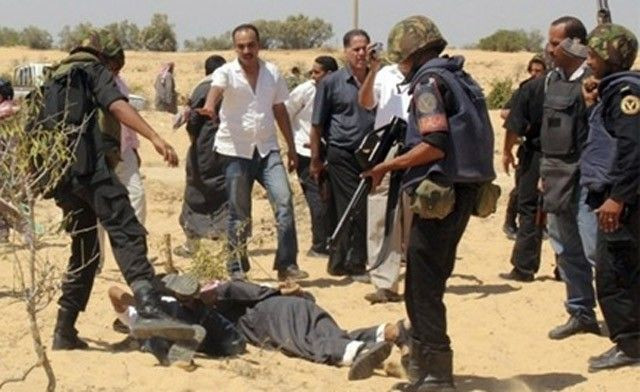Egypt Intensifies Hunt For Still-Anonymous Sinai Militants; Israel Nervous, But Supportive
ANALYSIS

The Egyptian military reportedly killed eleven jihadist militants hiding in the Sinai peninsula as part of its "broadening" and "stepping up" of its offensives in the area.
Egypt has been increasing its military presence in the Sinai following attacks at the beginning of August in which a group of militants killed 16 Egyptian soldiers near Ramah and crossed the Israeli border before being stopped by the Israeli Air Force.
The Egyptian Defense Ministry said that "forces will be redeployed in a variety of places in Sinai in order to complete the hunt for terrorists," despite the fact that on Tuesday, Egypt said they would be suspending their military activity in the area in accordance with discussions with the jihadist leaders in the area.
As of yet, no one group has stepped forward to claim responsibility for the August 5 attacks, but suspicion rests on a gaggle of jihadist groups hiding out in the Sinai Peninsula.
Mount Halal, which stretches from Fallujah to the Suez Canal in the Sinai desert, is rumored to be a refuge for many of the Sinai militants. The area is home to Bedouin tribes, who know the ins and outs of the mountains.
According to the Egyptian News Outlet Egypt Independent, there could be as many as 3,000 fugitives and militants fleeing the government.
But no one seems to know exactly who these people are. Most experts say they are Egyptian, according to both the Washington Post and Al-Arabiya in Cairo.
Another Egyptian outlet, Ma'an News, said that Egyptian security officials had told them that the attacks were carried out by recently-freed Egyptian prisoners.
One group made its presence known on August 1st, four days before the attacks near the border. They called themselves "Soldiers of Islamic Law," and, according to the Post, "called for the expulsion of U.S. troops from the Sinai and urged Egyptian security forces to refrain from intervening in the 'fighting with the Jews.'"
Another group, called Al-Salafiyya al-Jihadiyya (roughly translated as "The Forefathers of Jihad"), put out a statement at the beginning of August, warning the Egyptian military not to get caught between them and Israel.
"We don't want our strength to turn against you [the Egyptian military] for any reason," the statement said, according to the Post.
Meanwhile, Egypt is moving more and more men and equipment into the Sinai region. By all accounts, Israel is not pleased with these developments; it has a vested interest in the continued de-militarization of Sinai.
Since the attacks, Israel has expressed concern that Egypt may be pushing in more people and equipment than is allowed by the 1979 peace treaty, an allegation Egypt denies.
Egyptian President Mohammed Morsi told Reuters recently that the campaign in the Sinai, called Operation Eagle, is "in full respect to international treaties."
Morsi even indirectly told Israel not to worry about the military in the area.
"Egypt is practicing its very normal role on its soil," Morsi told Reuters, "and does not threaten anyone, and there should not be any kind of international or regional concerns at all from the presence of Egyptian security forces."
And Israel, for the moment, has relented.
"We made it clear to Egypt that they should do something about this," Itzhak Levanon, the former Israeli ambassador to Egypt, told the Washington Post.
"Those people were out to destroy the future relations between both countries."
Another Israeli official took a practical view.
"We need to look at this realistically," said, Amos Yadlin, former General and Chief of Staff of the Israeli Air Force to the Israeli military outlet Galei Tzahal.
"The Egyptians going in helps Israel in a large way."
© Copyright IBTimes 2024. All rights reserved.






















